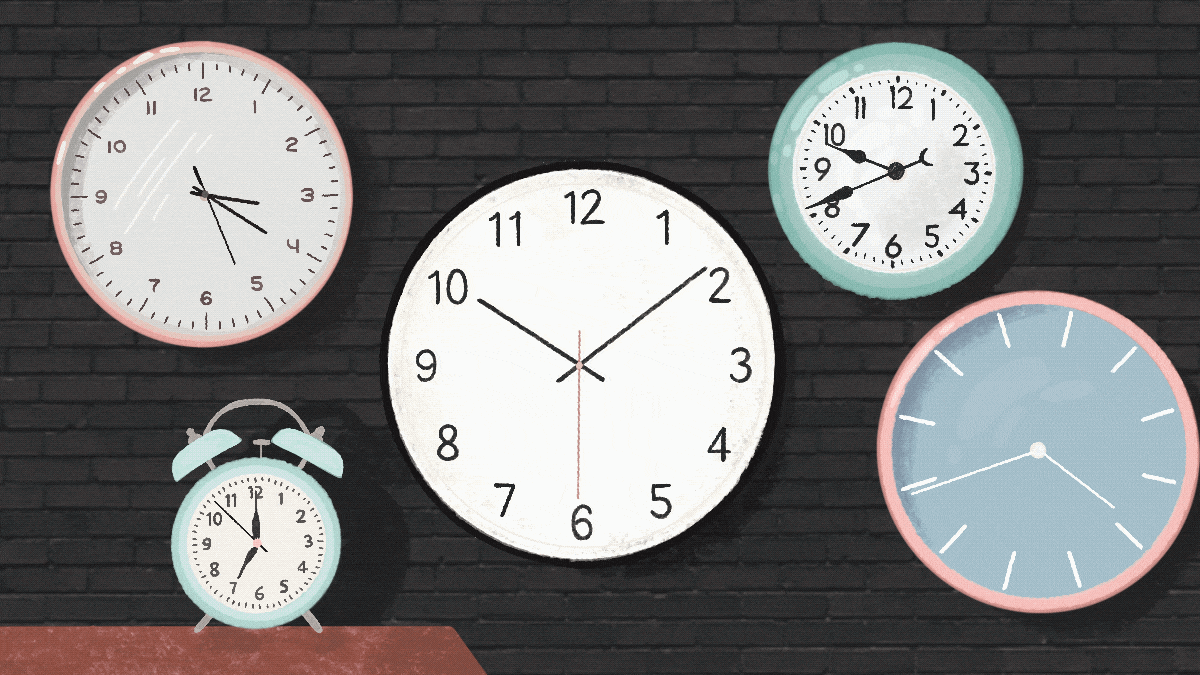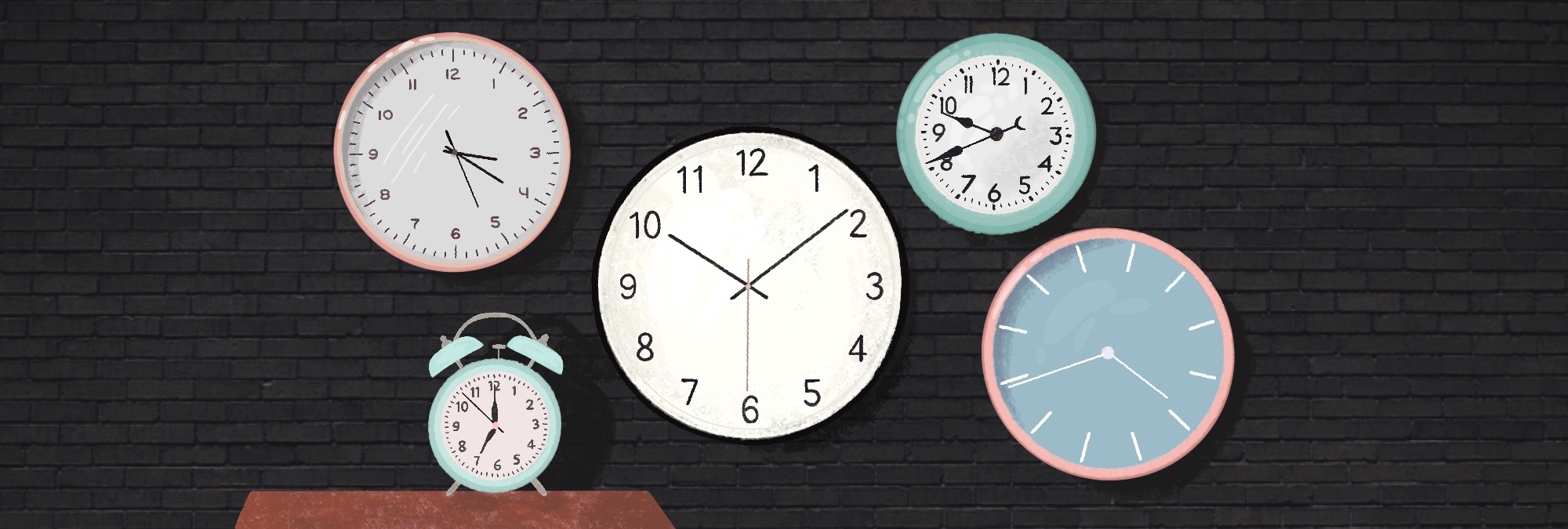Can physics explain our experience of ‘corona time’?

You might have heard that it’s July now. The year is, apparently, already half over. But how can this be possible?
It’s a known fact that every day of March lasted several eternities. April and May were at least 1,000 days long - each. But then, hang on, what happened to June?
How can time be taking so long to pass, and then immediately disappear from the rear-view mirror like it never happened?
There’s someone at ANU who can answer these questions.
It’s the man who once hosted an ANU event called “Is existence an illusion?” There was a time when such a question seemed a little left-field, but now, I don’t know, sure. It seems like a reasonable possibility.
Dr Peter Riggs is a physicist and philosopher of science at the ANU Research School of Physics. He spoke with us over the phone from his home in Canberra.
So, to start with, what is time?
Well, that's a very deep question. From an academic perspective, we don't actually know what time is.
We know some of the characteristics of time mainly from, for instance, Einstein's relativity theories. But we don't really have an answer, at a fundamental level, of what time is.
We understand the way it structures our lives. And we understand some of our perceptions of it. And at a physics level, we understand how it fits in for the way that we can predict phenomena, but as to what it is? That's still a very big question that we haven't answered yet.
What has been your experience of ‘corona time’?
Funnily enough, I mainly work from home, so the crisis hasn’t really affected what I normally do, but I have observed changes in other people's temporal experience over this period of lockdown.
There seem to be three changes.
The first one is loss of placement in time, because every day seems the same. So that is due to the absence of the usual temporal cues we have like going to work and coming home and other routine things which break the days up into weekdays and weekends.
The second change is that the perceived passage of time is altered, and this is quite fascinating, actually.
There's a perception of the passage of time as we speak, from moment to moment, and there's a perception of the passage of time in retrospect, when we think back on the last couple of months. And basically, they can be different.
How you perceive the passage of time is very much dependent on your activity and also on your emotional state. So, right at the moment, whether time might seem like it's dragging or it's going faster is dependent very much on your personal circumstances. People who are busy during this crisis, such as nurses, for them the day is flying by. Then you've got the person who's not doing a lot, so for them, the day's dragging. If you’re stressed, that also affects the way you perceive the passage of time. Psychologists have been writing about this for a number of years now.
But we’re talking here about the perceived passage of time on a daily basis. On a reflective basis, when somebody has been in lockdown for a couple of months and they think back on the last couple of months, it's interesting that they can have a different view from the daily view.
Right, like the days took forever, but looking back, the year has flown.
Yes, and this also really depends on your memories too. You tend to have made more memories if you’ve got strong emotional input. But if you’re sitting at home, not doing much, you’re not forming a lot of memories, because there’s not a lot of input. That will tend to affect your retrospective view of how time has passed over the last few months.
The third change that I've noticed is the perception of time intervals. You might normally think, ‘Well, I know what a month feels like’ and it's much the same as other months. Now that perception of length of time has also been altered because of the crisis situation. And in particular, if someone's been stuck at home then they might find when they think back over the last few months, those time intervals seem longer than they did previously.
And while we’re experiencing all these crazy changes in our perception of time, what is actually happening to time in the physical universe?
Nothing. These impacts are all psychological or physiological. Time itself is unaffected by whatever people get up to. As you might expect.
So time is just ticking along at the same rate, no matter what?
Well, time is real, and objective. It is part of the fabric of the Universe. But the passage of time, I argue, is itself an illusion.
We all feel that time ‘flows’ but there’s nothing in the laws of physics to explain that, so philosophers have developed two main theories about time since physics can’t decide the question – not yet, anyway.
In one, the passage of time is an objective process, and in the other, it isn’t. I argue that because the rate of the passage of time seems to depend on what you're doing, then it can't be objective.
For example, you can have people at the same location, watching the same thing, like a football match, and one person loves football so the whole match goes really quickly because they’re really into it. And another person who's been dragged along there, who doesn't like football, they’ve gotten so bored and it’s gone on forever. Two people at the same location watching the same thing: yet their perceptions of time are totally different.
I argue that cases like this really do indicate that the rate of the passage of time is purely psychological.
This has some implications for what we think the objective nature of time is: if the rate is just psychological, perhaps the passage is just psychological as well.
And people’s experiences of ‘corona time’ support this theory?
Yes, you could say they reinforce some of the arguments I’ve made previously.

Yes, and in lockdown that illusion has continued.
I don’t know if this should make me feel better or worse. What about clocks: are they an illusion too?
The units of a clock are arbitrary, but the actual length of the day and the year are set by nature: the rotation of the Earth, and the revolution of the Earth around the Sun. These are natural intervals we use for our timekeeping.
Don’t you think the clocklessness of ‘corona time’ has highlighted the extent to which we’ve let these arbitrary units dictate our life?
I don’t know if they dictate our life. Clocks are more to keep track of what we do and to allow us to plan our lives, so for example, you and I can agree to have a chat at 11:30am today.
I suppose clocks are okay. We’ll let them be real. One final question. You once hosted an event called “Time travel: what’s the current status?” So, just checking in on this, could we have shifted to an alternate timeline?
Only in our minds, Tabitha. The mind is an amazing thing. It conjures up all sorts of perceptions. I’m almost tempted to say delusions. Some of the experiences people are having now are almost delusional. After the crisis, those delusions will disappear. We’ll look back and think, ‘Well, wasn't that strange?’
It’s the right time to study physics at the ANU Research School of Physics, the largest university-based physics research and teaching activity in Australia. Find out more about our undergraduate and postgraduate programs.



